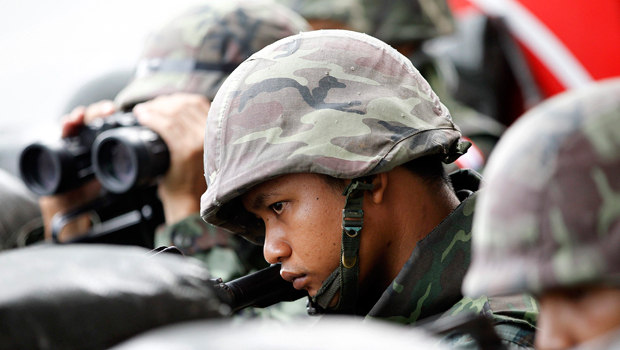The government doused hopes of a compromise to end fighting that has killed at least 31 people, all civilians, and wounded 230, transforming one of Asia's most dynamic cities into a battleground and raising the risk of a broader conflict. "We cannot retreat now," Prime Minister Abhisit Vejjajiva said in a televised statement, encapsulating the government's all-or-nothing campaign to end two months of protests seeking to topple his fragile, ruling six-party coalition.
The mostly rural and urban poor protesters, supporters of ousted Premier Thaksin Shinawatra, accuse the government of colluding with the royalist elite and meddling with the judiciary to bring down two Thaksin-allied governments.
Analysts and diplomats said the military appears to have underestimated the resolve of thousands of "red shirt" protesters barricaded in a 3 sq-km district of luxury hotels and shopping malls for six weeks.
"Unless the government cracks down and does so decisively — and that's a big if — we are going to be seeing rioting and guerrilla warfare, possibly spreading out to other areas," said an Asian diplomat who declined to be identified.
That was already starting to happen. A state of emergency has spread to more than a quarter of the country after emergency decrees were declared in five more provinces on Sunday, bringing the total to 22, as violence erupted in the north and northeast, a Thaksin stronghold home to just over half of Thailand's 67 million people.
In Ubon Ratchathani province, protesters burned tires on several roads. One group tried to break into a military compound but was forced back by soldiers firing guns in the air.
"The potential for a broader civil conflict is high," said Federico Ferrara, a political science professor at the National University of Singapore. "It is conceivable they might have an even worse problem on their hands after they have 'cleansed' Bangkok of the red shirts — especially if they have to massacre hundreds of people in the process," he added.
At least 60 people have died and more than 1,600 have been wounded since the red shirts began their protests in March, according to government figures.
A red shirt leader, Nattawut Saikua, called for a cease-fire and UN-moderated talks to end the violence that began Thursday evening with an attempted assassination on a renegade general advising the red shirts, who was shot in the head.
"We have no other condition. We do not want any more losses," he told supporters.
But the government swiftly dismissed the offer. "If they really want to talk, they should not set conditions like asking us to withdraw troops," said Korbsak Sabhavasu, the prime minister's secretary-general.
As fighting raged in two areas of the city of 15 million people, residents hoarded food at supermarkets, stayed indoors or fled to escape neighborhoods transformed into battlegrounds.










